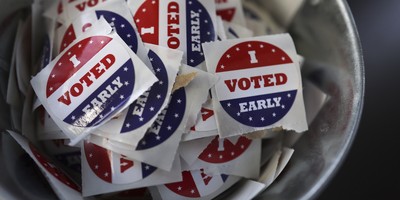Here's a thought: The GOP presidential primaries may well prove to be inconclusive, with the nominee actually being chosen at the convention in Tampa, Fla., in the fourth week of August next year.
True, it has been generations since a presidential nominating convention actually made that decision, although, admittedly, this idea pops up every four years. The last GOP contested convention that went beyond the first ballot was in 1948, when Thomas Dewey was chosen on the third ballot -- and went on to lose to Harry Truman. For the Democrats it was in 1952, when Adlai Stevenson was also chosen on the third ballot -- and also went on to lose, to Dwight Eisenhower. The longest was the Democratic convention of 1924 that went on for over two weeks and took 103 ballots to nominate John Davis, who lost to Calvin Coolidge.
There may be a pattern there. As Professor Terry Madonna and Dr. Michael Young point out in their insightful Dec. 6, 2007, article "What if the Conventions are Contested?" "It is no coincidence that brokered conventions ended after networks began to televise them. The 1952 convention is instructive. Actually settled on the first ballot when Dwight Eisenhower beat Robert Taft, the intraparty brawling that preceded the Eisenhower victory appalled thousands who watched it on TV."
In fact, hotly contentious conventions -- whether the GOP in 1912 or the riotous Democratic Chicago convention in 1968 -- often augur poorly for the general election. But whether good news or bad, five odd features of this season's GOP primary process suggest inconclusiveness.
Recommended
First is the much-mentioned, weak front-runner Mitt Romney. He has consistently commanded about 25 percent in the polls. Is that a floor or a ceiling? Conservatives urgently want to nominate an undoubted and solid conservative. With the Republican primary voters increasingly conservative over the last generation, it would be curious if the GOP nominated the least perceived conservative two times running -- first Sen. McCain in 2008 and then Romney in 2012.
Second, equally important with nominating a conservative, the GOP primary voters urgently want to defeat the incumbent, and they hold that passion more powerfully than we have seen in living memory. The conviction that the incumbent is plunging the nation into soon-to-be-irreversible, statist decline is driving the voters both to want to chose the most electable candidate and to make sure they pick a candidate with the conviction and the capacity to radically reverse course back to traditional conservative American values and programs.
But do those strong feelings help Romney (seen by many as the most electable), or do they hurt him because he is not seen as convinced in his conservative policies? Will the wild voter preference swings for and then away from various true conservative non-Romney candidates continue as the voters feel this election is too important to make a quick -- and possibly wrong -- choice?
Third, unlike previous primaries, the candidates announced late, they are underfunded -- even Romney and Perry -- there is little advertising or funds for it, and there are smaller state campaign operations with less paid and volunteer staff.
Fourth, perhaps most important, between constant cable television debates with very high viewership, talk radio, internet and social media, this is the most and earliest nationalized primary process we have ever seen.
The purposes of heavy advertising and powerful state operations are to persuade voters to their candidate, identify those voters and get them to the polls -- often in harsh winter conditions. But with massive coverage of the constant debates and with intense motivation of the voters (perhaps with social media as a cheap substitute for traditional get-out-the-vote efforts) it may be that big budget campaigns may not be decisive.
More important, those traditional campaigns tend to move voters to the leading candidate -- and tend to keep them corralled in that camp. But without the steadying effect of such campaigns, a contest defined by national debate rather than state organization may be singularly susceptible to continued voter fluctuation and thus, to a lack of early decisiveness.
Fifth, consider also that the GOP changed its winner take all rules. Now, any state that holds a primary or caucus before April 1 must award their delegates on a proportional basis, rather than the winner-take-all method. This means that a front runner with, say, a 38 percent plurality in a six-way split field will get only 38 percent of the delegates instead of 100 percent. This will keep second tier candidates in the hunt and deny the front-runner the steamroller effect that usually delivers a de facto winner in the GOP by February.
And here is the kicker. If we do go into the August convention with no candidate holding a majority of the delegates, then the door is open to non-primary candidates being nominated after the first inconclusive ballot. Mitch Daniels, Chris Christie, Mike Huckabee or others could get in the race. Or a brilliant speech by Newt Gingrich could take the convention by storm.
Break out the Nicorettes and flavored Vodkas. We could be in for the modern version of smoke-and-whisky-filled rooms in Tampa next August.

























Join the conversation as a VIP Member